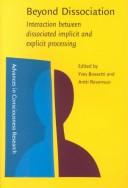| Listing 1 - 1 of 1 |
Sort by
|

ISBN: 058546121X 9027299927 1282254979 9786612254970 9780585461212 9789027299925 9789027251428 9027251428 9781556196652 1556196652 9781282254978 6612254971 9027251428 1556196652 Year: 2000 Publisher: Amsterdam Philadelphia, PA J. Benjamins
Abstract | Keywords | Export | Availability | Bookmark
 Loading...
Loading...Choose an application
- Reference Manager
- EndNote
- RefWorks (Direct export to RefWorks)
Analysis and dissociation have proved to be useful tools to understand the basic functions of the brain and the mind, which therefore have been decomposed to a multitude of ever smaller subsystems and pieces by most scientific approaches. However, the understanding of complex functions such as consciousness will not succeed without a more global consideration of the ways the mind-brain works. This implies that synthesis rather than analysis should be applied to the brain. The present book offers a collection of contributions ranging from sensory and motor cognitive neuroscience to mood management and thought, which all focus on the dissociation between conscious (explicit) and non-conscious (implicit) processing in different cognitive situations. The contributions in this book clearly demonstrate that conscious and non-conscious processes typically interact in complex ways. The central message of this collection of papers is: In order to understand how the brain operates as one integrated whole that generates cognition and behaviour, we need to reassemble the brain and mind and put all the conscious and non-conscious pieces back together again. (Series B).
Consciousness. --- Dissociation (Psychology) --- Defense mechanisms (Psychology) --- Apperception --- Mind and body --- Perception --- Philosophy --- Psychology --- Spirit --- Self
| Listing 1 - 1 of 1 |
Sort by
|

 Search
Search Feedback
Feedback About UniCat
About UniCat  Help
Help News
News